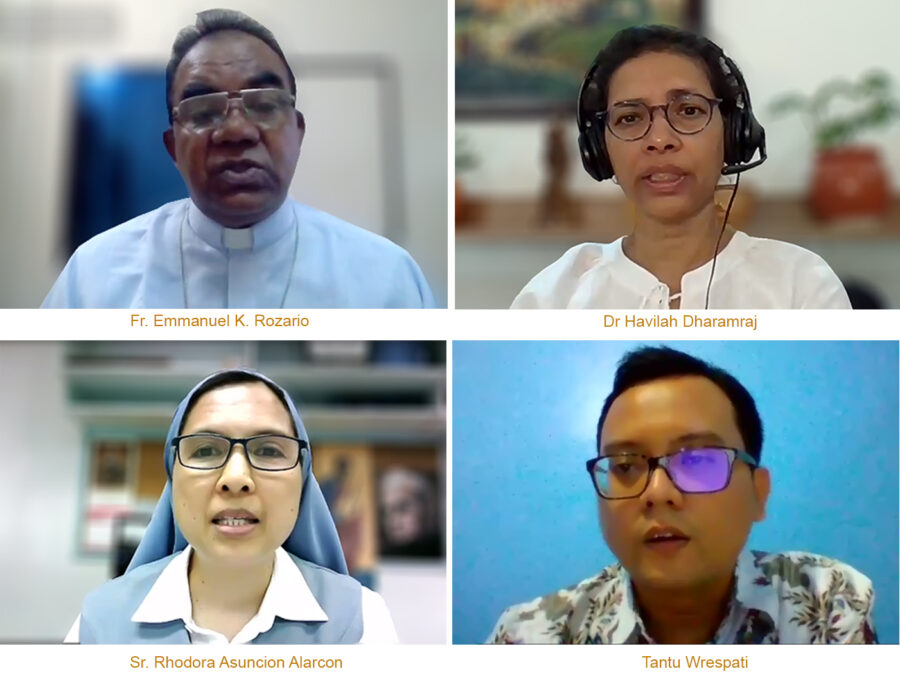Authentic love surmounts the worst barriers to strengthen familial relations, says Catholic Bishops Conferences official at CCA Symposium

“Authentic love surmounts the worst barriers. We must prioritise dialogue, quality time, valuing the other, and keeping an open mind – all of which are essential for fostering love in the family,” said Fr. Emmanuel K. Rozario, Executive Secretary of the Federation of Asian Bishops Conferences (FABC) Office for Laity.
Speaking at the Christian Conference of Asia’s (CCA) Symposium on ‘Family Life and Family Values: Transitions from Tradition to Modernity’ on the second day, Bangladeshi Roman Catholic priest, Fr. Rozario, elucidated upon ‘The Papal Exhortation on Love in the Family: “Amoris Laetitia” (The Joy of Love)’.
Fr. Rozario provided a comprehensive overview of the document while demonstrating its lessons for pastoral ministry and care for families. Such pastoral approaches, he recommended, could include long-term and short-term preparations and counselling to accompany married couples and families.
He also added that the church must not condemn or judge without considering individual struggles, but instead meet people where they are.
“The purpose of the ‘Amoris Laetitia’ is to encourage families and bring hope to those in difficult situations, help Christian families to persevere with fidelity and patience, and experience God’s love,” shared Fr. Rozario.
Presenting Biblical-theological perspectives on family life and values, Dr Havilah Dharamraj, a professor of Old Testament at the South Asia Institute of Advanced Christian Studies, explained the Biblical perspective on the resolution and reconciliation of familial concerns and conflicts.
Analysing and interpreting the context of 2 Samuel 14, which covers the dysfunction between David and his son, Absalom, Dr Dharamraj said that unwillingness and delay in reconciliation could lead to bigger tragedies, and thus it was important to resolve discord and contentions among family members.
An Old Testament scholar of a leading theological educational institution with an evangelical ethos, Dr Dharmaraj also emphasised the role of the extended family in Asian culture.
While addressing the theme on ‘Challenges of digitalisation in family life: Parenting and Isolation’, Sr. Rhodora Asuncion Alarcon from the Philippines shared the pressures upon parents who had to take up greater responsibility considering the education of their children amidst the COVID-19 pandemic.
The Roman Catholic nun from the Daughters of St. Paul highlighted the urban-rural divide and disparities in household wealth which gave rise to two new classes – the “information haves and the information have nots”, and she shared the challenges of digitalisation for parents on either side of the divide.
Sr. Alarcon also shared strategies for “positive digital parenting”, which included open communication, regular interest in the children’s online activities, and active protection of children’s digital identity and privacy.
Tantu Wrespati, a psychologist and founder of the Gaverta and Borneo Parenting Club in Indonesia, spoke about the six essential qualities of the family, namely commitment, appreciation and affection, positive communication, enjoyable time together, ability to cope with stress and crises, and spiritual well-being.
Mr Wrespati also addressed the issues of miscommunication and misunderstandings caused due to “generation gaps” among family members.
Throughout the second day of the three-day Symposium, the participants emphasised the necessity of encouraging and nurturing communication, respect, and trust to strengthen familial relations.
The importance of positive forces such as patience, generosity, forgiveness, mercy, and love was also accentuated as key to bridge gaps between family members and restore families to wholeness.
The online Symposium on ‘Family Life and Family Values: Transition from Tradition to Modernity’, being held from 3 to 5 August 2021, is attended by 50 specially invited participants from across Asia.










